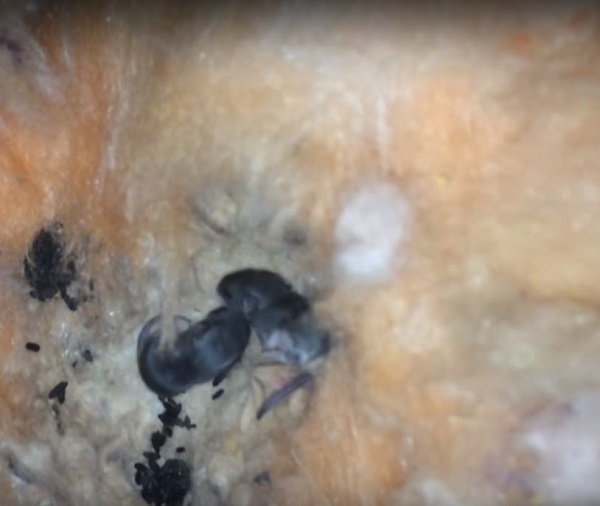One way you probably determined that you had mice in your home was to discover their poop lying about in key areas such as
their entryway, areas they frequent, and near their food source. When you found these piles of poop, you probably cleaned
them up and thought nothing more about it. In fact you were probably more worried about getting rid of the mouse than about
the tiny pieces of rice sized feces you swept up. Mice by their nature, are not fond of humans ( or most other animals for
that matter); this is why you have a much better chance of scooping up some mice fecal matter than you do of actually seeing
a mouse. In case that you do have an infestation in your home, there are some facts you must know when it comes to feces.
Mice, like most creatures, come in many different shapes and sizes but for the most part can be easily identified by their
droppings. All Mice can carry a myriad of diseases and may just be the pest in pestilence. Mice can spread disease in some
of the worst of ways. Rodents around the world have been known for some pretty earth shattering outbreaks of diseases throughout
human history.

So let’s make sure that you know if you’ve found Mouse excrement and identify the most likely places to look for it. Mouse feces tend to
be quite a bit smaller, than the fecal matter of other rodents like the rat, of course, but share many of the same attributes. Like the e
excrement of a rat, mouse excrement is similar to a grain of rice. It approximately 1/8 inch long with pointed ends (Rat poop is ¼ “with
rounded ends). Fresh droppings of all rodents are darker brown in color and then gradually lighten as they dry out. Mice will defecate
more than 70 pellets per day, far more than most other rodents. Fresh mouse droppings are relatively soft, and although it is feces, the
odor of mouse dropping is slight, especially when compared to the pungent ammonia smell of their urine. Don’t let the lack of smell fool
you. These feces are a dangerous and disease ridden time bomb.
Mouse feces are especially dangerous if there are younger children, sick, or elderly people in the Household. It can also be very dangerous to your pets.
Disease is spread from feces by touch, or as an airborne pathogen. Just a few of the diseases that can be spread are- Adenoviruses, Hantavirus Pulmonary
Syndrome, Lassa Fever, Leptospirosis, Lymphocytic Chorio/meningitis (LCM), Hemorrhagic Fever with Renal Syndrome, Salmonellosi and Tularemia. To avoid
becoming ill from contact with mouse fecal matter, you should check frequently for rodent activity in your home. Clean up any dropping you find immediately
using a broom and dustpan or rags. Always avoid direct contact. If the feces is old and dry, clean it up with a wet rag to avoid releasing it into the air.
Always disinfect the affected area, and wash your hands and face afterwards.
Go back to the
How to get rid of mice in the attic home page. You might also want to read about
how to kill mice and why the use
of snap traps is better than
mouse poison. Read an analysis of the different types of traps and how to use them on the
how to trap mice page.
Learn why
bait is not as important as trap type, placement and location. Also read a full analysis of
mouse repellent to understand why it
never works. If you see droppings and want to identify them, read the
mouse poop page. If you need to hire professional help, read about
how much does mouse removal cost?
or you can read this site to learn how to do it yourself. Feel free to email me about Is a house mouse feces dangerous to touch or breathe?